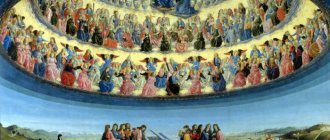If it can be proven that an incorporeal thinking being has a life of its own, independent of the body, and that inside the body it feels much worse than outside it, then, undoubtedly, physical bodies are of secondary importance;
they improve only as thinking beings change.
Beings in need of a corporeal shell clothe themselves in it,
and the bodies of those who soared to higher matters disintegrate. Thus, bodies ceaselessly perish and are continually born again.
Origen, one of the fathers of the Christian Church (185-254 AD)
Although some historical sources say that the doctrine of transmigration of souls in the Christian world was accepted only by a few free thinkers, much more can be said about the fate of this doctrine in the bosom of the Christian religion than is usually said. Now another concept is coming to the fore, according to which Christianity has recognized the doctrine of reincarnation from the very moment of its inception.
This was the case until the Second Council of Constantinople (553 AD), when church authorities decided that the reincarnation of the soul was an “unacceptable view” that was incomprehensible to ordinary Christians. A more detailed account of this council and its consequences is given below.
New Testament
According to the views of most Christian theologians, in the last lines of the Old Testament the prophet Malachi predicted what was to happen immediately before the coming of Jesus Christ: “I will send you Elijah the prophet before the coming of the great and terrible day of the Lord.” Malachi spoke these words in the fifth century BC, predicting the reappearance of Elijah four hundred years after Elijah's life. This fact should greatly puzzle those who completely reject the doctrine of reincarnation of souls.
In the first book of the New Testament, Matthew mentions this prediction several times. In total, the evangelists refer to the prophecy of Elijah at least ten times. It is clear from the New Testament verses below that the writers and early interpreters of the gospels believed that the prophet Elijah would return as John the Baptist, and that the other Hebrew prophets would also come in other guises:
Having come to the countries of Caesarea Philippi, Jesus asked His disciples: Who do people say that I, the Son of Man, am? They said: some for John the Baptist, others for Elijah, and others for Jeremiah, or for one of the prophets (Matthew 16:13-14).
And His disciples asked Him: How come the scribes say that Elijah must come first? Jesus answered them: It is true that Elijah must come first and arrange everything, but I tell you that Elijah has already come, and they did not recognize him, but did to him as they wanted; so the Son of man will suffer from them.
Then the disciples realized that He was speaking to them about John the Baptist (Matthew 17:10-13).
Truly I say to you, of those born of women, none was exalted higher than John the Baptist; but the least one in the Kingdom of Heaven is above him.
For you can accept that he is Elijah, who must come. He who has ears, let him hear! (Matt. 11:11,14-15).
Despite the fact that these lines clearly refer us to reincarnation, some researchers try to refute the obvious by quoting verses 19 and 20 of the Gospel of John. The Jerusalem priests approached John the Baptist and asked him: “Are you Elijah?” He answered them: “No.” Then they asked him again: “Are you a prophet?” And he answered again: “No.” John rejected all attempts to identify him with Elijah, and generally denied that he had a prophetic gift, although this is often explained by the modesty of the Forerunner.
When the priests finally gave John a chance to speak, he answered their questions by quoting the prophecy of Isaiah 40:3: “I am the voice of one crying in the wilderness. Prepare the way of the Lord." In fact, he never told the priests who he was. Perhaps he did not remember his previous incarnations; This happens quite often. However, it seems that John the Baptist wanted to find a deeper answer that would not be reduced to the usual re-interpretation of an already existing tradition. He was not just Elijah, but Elijah who came with a new, special mission. Although this interpretation may seem far-fetched, it provides us with the only possible solution to the controversial issue. There is no other way to reconcile the negative responses of John the Baptist with the above statement of Jesus Christ, which clearly identifies Elijah the prophet with John. Christian doctrine is based on faith in the word of Jesus, and since he testified to the identity of Elijah with John, his statement must outweigh the words of John the Baptist himself. In fact, Christian theologians have accepted this interpretation precisely because they too find it absurd, even heretical, to partially believe in the word of Jesus.
In another episode, which is also mentioned in the gospels, Christ again speaks out in support of the idea of \u200b\u200bthe reincarnation of souls. When Christ and his disciples met a man blind from birth, the disciples asked: “Rabbi! Who sinned, he or his parents, that he was born blind?” (John 9:2). The very fact that Jesus' early followers asked him such a question suggests a belief in previous existence and reincarnation. Most likely, they were sure that before his birth this blind man lived in another body. Otherwise, how could a person who was blind from birth be punished with blindness for allegedly committing a sin?
Geddes MacGregor states unequivocally in relation to this episode: “This refers to the past life (or lives) of this person, during which the sin was committed, entailing such terrible consequences. A newborn baby could not be a sinner, unless we assume that he sinned while in his mother’s womb, which, of course, is absurd.”
Paul's letter to the Galatians can also be interpreted as indicating the existence of reincarnation: “Whatever a man sows, that will he also reap” (6:7). One human life is clearly not enough to reap all that has been sown.
The Book of Revelation contains the following words: “Whoever leads into captivity will go into captivity; whoever kills with the sword must himself be killed with the sword” (13:10). Although they are usually understood in the figurative sense: “If you have committed a crime, then the same crime will subsequently be committed against yourself,” another, quite natural interpretation of this verse can arise from the doctrine of the law of karma (cause and effect) and the rebirth of the soul. If we interpret these words literally, as other passages in the Bible are often interpreted, we inevitably come to the idea of reincarnation. Many soldiers, for example, die peacefully in their bed, far from the battlefield - and, by the way, not from swords - therefore, for the words of Revelation to come true, retribution must await them in the next life.
Bible passages similar to the ones above led Francis Bowen, one of the foremost Harvard philosophers of the 19th century, to think:
“The fact that the commentators of the sacred scriptures have been unwilling to accept the obvious meaning of direct and repeated statements, but instead have attempted to create fictitious metaphorical interpretations, only proves the existence of an ineradicable prejudice against the theory of transmigration of souls.”
Reincarnation and the early Church
As some modern adherents of reincarnation believe, the Bible does not explicitly contain this teaching because the Church abandoned it in the process of its historical development. Joseph Head and S. L. Cranston, in their book on reincarnation entitled Reincarnation: The Phoenix Fire Mystery, state that “The New Testament was not written down until long after the death of Jesus, and his books subsequently passed through the censorship of church councils. In the sixth and subsequent centuries, when the present Bible was adopted, there were several different gospels. Those that were considered unacceptable were burned” [5].
Was the original Bible censored? The charge made by Head and Cranston is quite common, but is based on a misconception about early Christianity. Disputes regarding the time of writing of the New Testament have almost subsided today, since researchers have come to an agreement. The vast majority of biblical scholars—both liberals and conservatives—now date the writing of the entire New Testament to the second half of the first century. John A. T. Robinson, a famous British liberal scholar, is convinced that all the books of the New Testament canon were written by 70 AD. e. Although most scholars believe that the Gospel of John and Revelation were written twenty years later, we can be quite sure that the entire New Testament was either written by eyewitnesses of Jesus' ministry or compiled from the words of these eyewitnesses. This origin greatly strengthens the historical authenticity of the Scriptures, especially the four Gospels.
In the first and second centuries, the Gospels and Epistles were widely distributed throughout the Christian churches of the Mediterranean. After a short time there was more or less complete agreement as to which scriptures were inspired and authentic and which were not. The church in post-apostolic times used three criteria:
- Apostolic authorship. Was this document written by an apostle? If not, did its compiler (for example, Luke) act with the approval of the apostle? Sometimes this approval was expressed in the fact that the document was compiled from the words of the apostle, that is, it was written down by his assistant, student, or even personal secretary (scribe).
- Doctrinal conformity. Did the document contain the authentic teaching of the apostles? This could be found out quite easily by comparison with other apostolic writings and the oral tradition perpetuated in the apostolic tradition.
- Public use. Those documents which in most churches were constantly read aloud as divine revelation were, over time, recognized as inspired. Thus, by the end of the second century, the canonical writings were widely accepted [6]. They began very early to be quoted as Scripture along with the Old Testament (see 2 Pet. 3:16).
A period of "purification" followed, during which doubts were raised about the reliability of certain books, such as Hebrews, James and Jude, 1 John, and Revelation. Some minor differences between local assemblies in the number of books used were encountered as early as the 4th century, but nothing containing even a hint of Gnosticism was ever allowed in the apostolic churches.
There were other documents that were also subject to scrutiny, resulting in the exclusion of even some popular orthodox works such as the Didache and the Shepherd of Hermas. Most of the New Testament apocrypha (non-canonical books and Gospels) has survived to this day and is quite accessible; Scientists have recently re-examined them. It has been established that these books, mostly of Gnostic origin, were written in the 2nd and 3rd centuries as commentaries or additions to the original four Gospels of Matthew, Mark, Luke and John. Thus, all the apocryphal Gospels were written two or three centuries after Christ left this world, and could not have been written by eyewitnesses, which deals a serious blow to their reliability.
Since Jesus prepared the way for the writing of the New Testament by giving His apostles His authority (see Matt. 16:19), we can be confident that in our current canon we have an accurate representation of the life and teachings of Jesus, as well as a reliable interpretation of His ministry presented the apostles in their epistles. After the death of the apostles, their words were guarded with the greatest care and care to preserve the true teachings of Christ.
Were there unwritten, secret teachings of Christ? The hypothesis that the true esoteric teachings of Christ were kept secret has a long history. It was first put forward by some Gnostic sects in the 2nd century and then refuted. The great apologist Irenaeus of Lyons, disciple of Polycarp of Smyrna (disciple of the Apostle John) in 190 AD. e. examined this problem in his work “Against Heresies”: “For if the apostles knew the secret sacraments, which they communicated to the perfect separately and secretly from others, they would have handed them over especially to those to whom they entrusted the churches themselves” [7].
However, two theosophical writers claim that the early Christians freely believed in reincarnation until they were forbidden by church councils.
Only almost five centuries after the emergence of Christianity, when it had long been the state religion of Rome, was the belief in reincarnation declared inconsistent with orthodox dogma [8].
The doctrine of reincarnation was recognized by some Church Fathers, and it was so widespread in early Christianity that even in the middle of the 6th century after Christ, it was necessary to convene a special Council of the Church to finally suppress it [9].
The authors quoted above refer to certain church councils chaired by elderly clergymen, who, out of their characteristic adherence to rigid dogmatism, anathematized the doctrine of reincarnation. By the way, not a single church council of the first millennium made any decisions on this matter. This question was not even raised at the Ecumenical Councils. The only time such a problem arose was with the third-century theologian Origen, whose speculations regarding the pre-existence of souls were anathematized at the Council of Constantinople in 553. However, in his later writings, Origen specifically denied reincarnation (see below).
Proponents of the doctrine of reincarnation sometimes find themselves caught in the trap of inconsistency before they realize that it has slammed shut: one cannot call the Bible an edited selection of patristic writings (as Head and Cranston do) and at the same time use biblical passages taken out of context to support the theory of reincarnation. If the Church Fathers decided to uproot reincarnation from the Bible, they would certainly remove Jesus' words about John the Baptist and Elijah. The view that reincarnation is present in the Bible is in stark contrast to the assertion of many reincarnation proponents that the doctrine was removed from the Bible or anathematized by church councils. You cannot insist on both at the same time.
Did the early Church preach reincarnation? We have already seen that the doctrine of reincarnation was part of the Hellenistic society of the first and second centuries, in the midst of which the Church was formed. This was a consequence of the influence of early Platonism and the Hindu worldview. They say that the Indian Buddhist king Ashoka in the 4th century BC. e. sent missionaries to the Mediterranean; and when this influence became intertwined with Greek philosophy, numerous mystery cults and Gnosticism flourished. Kenneth Scott LaTourette, a Church historian, gives an example of one of these heretical teachings that created the spiritual environment around the early Church:
Various sects associated with the name of Orpheus believed that matter and flesh are evil, and that the human soul must get rid of this corruption. They also taught that people, being born again and again, are each time captured by the flesh and faced with all the diseases inherited by the flesh, until the soul can free itself from the body. Once the separation occurs, the soul will live in bliss forever. This liberation was achieved through the rite of initiation, purity and asceticism [10].
Confronted with such ideas, the early Church continually strived to maintain its uniqueness and its teachings. Many pagan converts to Christianity were internally predisposed to Greek philosophy, Gnosticism, or mystery religions. Pagan converts were often influenced by the idea that soul and body were in constant conflict with each other (which gave rise to mystical speculations and rites), while Jews always perceived body and soul as one. As a result, pagans often had difficulty accepting the heritage of Judaism and the Old Testament ideas, without which a correct understanding of Christianity is impossible. There is no doubt that these influences penetrated into the Church more than once, and they had to be fought against. The Apostle Paul addressed this issue in his letter to the Colossians, as well as in other New Testament letters.
And what about the Fathers of the Church themselves? Have they ever accepted the doctrine of reincarnation? Similar views have been attributed to three thinkers in particular: Justin Martyr, Origen and Jerome.
Justin Martyr. Modern proponents of the doctrine of reincarnation have repeatedly referred to Justin Martyr (100-165 AD), one of the first Christian apologists. An anonymous British cleric writes: “There is no doubt that many Church Fathers held [the doctrine of reincarnation] or were more or less inclined to do so. Justin Martyr clearly says that the soul does not live in one human body, and argues that souls that fail to cope with their duties pass into cruder forms” [11]. The author of these lines bases his opinion on the work of Justin “Conversation with Tryphon the Jew,” written around 155 AD. e. - about 20 years after the dispute with Tryphon the Jew, which took place shortly after Justin’s conversion. In this text, Justin and Tryphon spend some time discussing the transmigration of souls and come to the conclusion that this is not such a good idea:
- So, souls do not see God, do not pass into other bodies, otherwise they would know that they are being punished in this way, and would be afraid to commit the slightest sin later. But I agree,” [Tryphon] continues, “that souls are capable of understanding that there is a God, and that justice and piety are good.
“You’re right,” I answered [12]
Origen. The greatest controversy over reincarnation in the early Church centered around the teachings of Origen (185-254). Head and Cranston categorically state: “There is no doubt that Origen preached the pre-existence of the soul in the former economies of this world and its reincarnation in future economies” [13]
The brilliant abilities of Origen, one of the greatest thinkers of early Christianity, gained him both admirers and opponents in the Church. Heavily influenced by Greek philosophy, Origen (at least in his early writings) did write about the pre-existence of souls, i.e. that humans were once angelic beings whose good or bad deeds determined their good or not so good birth on earth. However, Origen's writings on the pre-existence of souls specifically denied the possibility of transmigration of the soul after its first incarnation. Many Christian scholars also cannot say for sure whether Origen believed in reincarnation, but they seem to have simply not carefully read what Origen wrote on the subject. In his commentary on the Gospel of Matthew, he directly addresses this issue in the chapter “The Relation of John the Baptist to Elijah - Consideration of the Theory of Transmigration of Souls”:
It does not seem to me that in this place the soul is called Elijah, otherwise I would fall into the dogma of the transmigration of souls, which is alien to the Church of God and was not transmitted to us by the Apostles, nor is it set forth in the Scriptures. For, notice, [Matthew] does not say “in the soul of Elijah,” in which case the doctrine of the transmigration of souls would have some basis, but “in the spirit and power of Elijah”[14]
In another passage he says: “Let those who are strangers to the teachings of the Church believe that souls pass from human bodies into dog bodies. We do not find this at all in the Divine Scriptures.” [15] Origen wrote his commentary on the Gospel of Matthew shortly before his death (c. 247), when he was more than sixty years old, and this work most likely contains his final opinion on this matter. question. The remark concerning Elijah and John the Baptist is accompanied by a lengthy refutation of the doctrine of transmigration.
Jerome. Jerome, a fourth-century saint and eminent linguist, is said to have also preached reincarnation. David Christie-Murray, in his work Reincarnation: Ancient Beliefs and Modern Evidence, argues that “St. Jerome supposedly affirmed the doctrine of reincarnation in his Epistle to Avitus, and that this doctrine was preached among the early Christians as an esoteric doctrine. In addition, Jerome was a translator and admirer of Origen" [16]
In fact, Origen's letter to Avitus severely criticizes Origen for his Platonic ideas and nowhere condones the doctrine of reincarnation. In his Epistle to Demetrius, Jerome also rejects Origen's doctrine of pre-existence, calling his literary excursions "the source of vulgar impiety."
Other famous Church Fathers. Several other early Christian writers also commented on the issue of transmigration with the usual sarcasm and polemical fervor of the time. Irenaeus entirely devoted one of the chapters of his work “Against Heresies” to the question of the transmigration of souls; The tone of this chapter is set by the title: “The absurdity of the doctrine of transmigration of souls.”
Tertullian, a brilliant theologian and lawyer from Carthage, in his Apology, traces the origins of the doctrine of reincarnation, starting with Pythagoras (c. 450 BC), and expresses the opinion that “the doctrine of transmigration of souls is a lie, not only shameful, but also dangerous. It really showed that the dead are made from the living; but it does not follow from this that they become alive from the dead” [17]
Describing the “implausible teachings of the pagans,” Gregory of Nyssa (335-395), one of the most original thinkers of the young Church, says:
They tell us that one of their sages said that he, while remaining the same person, was born a man, and then took the form of a woman, flew with the birds, grew like a bush, and took on the life of a waterfowl. And whoever said this about himself, as far as I can judge, was not far from the truth: for such teachings, saying that one soul has undergone so many changes, truly befit the chatter of toads and jackdaws, the stupidity of fish or the meaninglessness of trees [18]
The essence of the situation, perhaps, comes down to the fact that reincarnation was never a big problem or a serious issue for the early Church. Even Augustine, although he had been a Gnostic Manichaean for nine years before his conversion and was well acquainted with Platonic philosophy, mentions reincarnation only in passing. In his letter to Optat, he writes: “For it is impossible for you to hold the opinion that souls are imprisoned in earthly and mortal bodies because of their actions in a previous life.”[19]
Other Christian authors, such as Lactantius and Minucius Felix, also mention transmigration and condemn this doctrine. Although this issue has been touched on from time to time, no sources that have come down to us since the time of the first Ecumenical Councils indicate that Christianity ever considered this teaching to be a problem. The doctrine of reincarnation, although taught by a variety of non-Christian thinkers such as the Neoplatonists, was never part of the early Church. Origen's theories about the pre-existence of souls could easily develop into a complete borrowing of reasoning about the transmigration of souls, but his views on this issue, it seems, were never treated with real confidence.
The early Christians did not accept the doctrine of reincarnation largely because the Church of the first century was rooted in a worldview of Judaism that never accepted any systematic doctrine of rebirth. As MacGregor notes: “Although the Christian hope of resurrection is directly related to faith in the resurrection of Christ, the ground for the idea of resurrection was already prepared by its development in late pre-Christian Judaism.”[20]
Origen controversy
The founders of the Christian Church, such as Clement of Alexandria (150-220 AD), Justinian Martyr (100-165 AD), St. Gregory of Nyssa (257-332 AD), Arnobius (c. 290 AD) and Saint Jerome (340-420), repeatedly supported the idea of reincarnation. St. Augustine himself, in his Confessions, seriously thought about the possibility of including the doctrine of reincarnation in Christian doctrine: “Did I have a certain period of life preceding infancy? Was it the period that I spent in my mother’s womb, or some other one? ...And what happened before this life, O Lord of my joy, did I dwell anywhere, or in any body?”
Origen (185-254), who was named by the Encyclopedia Britannica as the most significant and famous of the church fathers (with the possible exception of Augustine), spoke out most openly about reincarnation.
Great Christians, such as Saint Jerome, who, in fact, translated the Bible into Latin, characterized Origen as “the greatest teacher of the church after the holy apostles.” Saint Gregory, Bishop of Nyssa, called Origen “the prince of Christian teaching of the third century.”
What was this influential and highly educated Christian thinker's opinion on reincarnation? Origen's views on this subject were set forth in the famous Gifford Lectures by the Rev. William R. Inge, Dean of St. Paul's Cathedral in London:
Origen took a step that would have seemed the logical conclusion of the belief in immortality to any Greek - he taught that the soul lives even before the birth of the body. The soul is immaterial, so its life has neither beginning nor end. ... This teaching seemed so convincing to Origen that he could not hide his irritation at the orthodox belief in the Day of Judgment and the subsequent resurrection of the dead. “How can one restore dead bodies, each particle of which has passed into many other bodies? - asks Origen. —Which body do these molecules belong to? This is how people sink into the quagmire of nonsense and cling to the pious assertion that “nothing is impossible for God.”
According to the Catholic Encyclopedia, Origen's teachings largely echoed the ideas contained in the theory of reincarnation, which can be seen in the teachings of the Platonists, Jewish mystics, and also in the religious scriptures of Hindus.
Historian and religious scholar Isaac de Beauzobre, commenting on Origen’s statements, derives from them a doctrine that almost literally reproduces the dictionary definition of reincarnation: “Without a doubt, Origen believed that the soul inhabits successively several bodies and that its migrations depend on good or evil deeds this soul."
Although the Church's founders held Origen and his teachings in high esteem—including his views on reincarnation (such as those outlined above)—the Roman Catholic Church changed its attitude toward Origen markedly after his death. It should be noted, however, that this change was not at all caused by his judgments about the transmigration of souls. Rather, it is explained by the fact that young Origen, in a fit of excessive zeal, castrated himself in order to forever maintain chastity. According to churchmen, anyone who is capable of mutilating his own body will never achieve holiness.
Origen paid dearly for his youthful fanaticism. The Church refused to canonize him precisely because of this, and not because of his views on reincarnation.
However, no matter how high the price paid by Origen, the Church paid even more. Because he was not officially declared a saint, his teachings were only selectively accepted by church authorities. As a result, his views on life after death were not accepted even by loyal adherents of the Christian faith. It is a pity, but the most hidden truths discovered by one of the fathers of Christianity were covered in the darkness of oblivion. And the entire Christian world is still paying the price for rejecting Origen.
The persecution of his ideas, however, fit perfectly into the religious and political situation of the 6th century. It was then that Origen's teachings came under official persecution by church authorities. Emperor Justinian (c. 527-565) wanted to convert all his subjects to Christianity, which was already very popular in his empire, pursuing certain selfish goals. However, among the Christians of that time, Origenists, Gnostics and other sects that accepted reincarnation predominated. The far-sighted emperor was afraid that believers would begin to neglect the commandments, rightly believing that more than one life was allotted to them to achieve spiritual perfection. If people were confident that they had several lives left during which they could correct the mistakes they had made, many would actually begin to postpone the fulfillment of their religious duty “for later.” And this would prevent Justinian from using the Christian faith as a political weapon.
Justinian reasoned that people would take their religious duties seriously if they were taught that they had only one life at their disposal, at the end of which they would go to either heaven or hell.
In this case, their zeal can be used for political purposes. He was not the first to think of making religion a kind of drug that unites people. However, Justinian went further - he began to manipulate religious doctrines and beliefs in order to acquire worldly power. He chose to give people one single life and then send them to either heaven or hell.
Justinian was confident that such radical measures would strengthen the desire of believers to be good “Christians”, and therefore law-abiding citizens loyal to their emperor.
History is silent about how noble Justinian's intentions were. Some researchers claim that in the end he himself believed in the doctrine of the “single life” concocted on his orders. Be that as it may, the ban he imposed on the teachings of Origen took the form of a papal decree: “If anyone believes in the inconceivable existence of the soul before birth and in the most absurd rebirth after death, he should be anathematized [cursed].”
Writer and historian Joe Fisher draws a logical conclusion from the above facts:
“Starting from 553 AD. e., when Emperor Justinian decisively rejected the idea of \u200b\u200b"the most absurd rebirth", Christians began to believe in eternal life, while forgetting about its sister - reincarnation. Christians are taught that eternity begins at birth. But since only that which has no beginning can be infinite, we can just as easily believe in the ability of a table to stand on only three legs!”
What is reincarnation
The meaning of this theory is that everything that exists on Earth lives not once, but several times. After the physical death of the body, a living soul can be reborn in another form, and not necessarily a human one. The most common teaching of this kind is in Hinduism, which, among other things, talks about karma - punishment for sins committed.
Reincarnation is the doctrine of the re-incarnation of the soul after the death of the body into another being.
According to Hindus, the law of karma—the result of actions committed in a previous life—influences the body in which the human soul is reborn. For example, if a person was too greedy, greedy, then next time he may be born a pig.
Interesting! The law of karma assumes that evil will always be avenged - a person will pay for the sins of this life with suffering and deprivation in the next life, and so on in a circle.
Accordingly, if a person is unhappy, suffers any hardships, illnesses, etc. - this is all his well-deserved punishment for the sins of past lives. This is how karma works, and its influence cannot be undone or mitigated.
Read about sins in Orthodoxy:
- Sin of idle talk
- What diseases are given for what sins
- Sin of anger in Orthodoxy
The purpose of human life, according to Hindus, is to accept one's karma, fulfill it through conscious asceticism and meditation, and ultimately merge with the Absolute (some kind of God). The trouble with man is that he thinks too much about himself, but by practicing meditation, he can become “nothing” and cognize the Absolute.
By the time of the advent of Christianity, certain religious mystical movements recognized the possibility of rebirth of the soul in one sense or another. However, Christianity in the person of Jesus Christ brought a new dogma - God came to earth and with His Sacrifice once and for all atoned for the sins of man, as if fulfilling everyone’s karma.
For quite a long period of time, mystical religions did not have significant significance in the world, remaining popular only among their limited groups of followers. Christianity acquired significant significance and influence in the world religious sphere and replaced such mystical teachings.
However, by the end of the 19th century there was a significant decrease in the spread of Christianity. The reason for this was the actively developing humanism and secularism, which completely denied everything supernatural and were based exclusively on rational principles of understanding all things.
The displacement of Christianity has led to spiritual hunger among many people. No matter how a person tries to explain everything from the point of view of materialism, the need for faith does not go away. But as true faith fell into decline, various occult, mystical and pagan spiritual practices began to revive - they perfectly suited people's needs for everything supernatural. It was during this period that the theory of reincarnation gained particular popularity and, to some extent, became fashionable.
In Hinduism, the concept of “transmigration of souls” is one of the fundamental
Since orthodox Christianity did not accept Hindu truths and tenets, there was an attempt to accommodate the theory of reincarnation and Christianity. Thus, the American theosophist Edgar Cayce tried to combine the incompatible, and the Christian community of America was presented with the idea that the rebirth of the soul is possible, but only into the human body.
Thus, the theory of reincarnation has reached our time in a rather modified form, incorporating certain parts of the teachings of various mystical religions and cults.
Refutation of the anathema
Some historians firmly believe that the church never actually cursed Origen, or that the curse was later lifted. Therefore, modern Christians can accept the concept of transmigration of souls proposed by him. Such judgments are set out in detail in the Catholic Encyclopedia.
There is evidence that Pope Vigilius, the main representative of church authorities at the Second Council of Constantinople, did not at all insist on condemning Origen and even opposed the ban on his teachings. According to some sources, it was this church leader who later rescinded the anathema decree.
History says that the Second Council of Constantinople took place on May 5, 553. The Patriarch of Constantinople presided; In addition, representatives of the church authorities of the western and eastern parts of the Christian world were present at the council, who had to decide by voting whether Origenism (as the doctrine of reincarnation was called) was acceptable to Christianity. But Emperor Justinian controlled the entire voting procedure. Historical documents indicate that there was a conspiracy to forge the signatures of Western representatives, most of whom shared the views of Origen. Among the one hundred and sixty-five bishops who signed the decree against Origenism, there could not have been more than six envoys from the West. Realizing that foul play was being played at the council, Pope Vigilius refused to be present at the final verdict.
The results of the Council of Constantinople have been summarized by theologians and historians of the Christian Church as follows:
Opponents of Origenism convinced Emperor Justinian to write a letter to the Patriarch of Constantinople, in which Origen was described as a malicious heretic. By order of Justinian, a church assembly met in Constantinople in 543, the result of which was an edict that listed and condemned the errors allegedly committed by Origen.
This edict, which was supposed to reconcile the West with the East, only deepened the rift between them. Pope Vigilius rejected the imperial edict and quarreled with the Patriarch of Constantinople, who supported Justinian. But after some time, the pope changed his mind and, prudently leaving no official confirmation of the emperor’s right to interfere in theological discussions, nevertheless issued a decree in which he anathematized the teaching prohibited by the imperial edict. This decree displeased the bishops of Gaul, North Africa and many other provinces, and Vigilius revoked it in 550 (that is, only three years before the ecclesiastical court dealt the final crushing blow to Origen's teachings).
Kingdom of God
The message that Jesus brought, according to the Gospels, can be summed up in two words: the kingdom of God. This phrase or its variants (“Kingdom of Heaven” or simply “Kingdom”) appears 74 times in the four Gospels. In the context of the Old Testament, Judaism of the first century AD. e. and the rest of the New Testament books, this expression meant that God's reign would bring an end to the present world of oppression, suffering, sin and chaos. The Kingdom of God was to be the restoration of the fallen world, a miraculous transformation brought about by the appearance and action of God—in short, the end of the world as we know it. Jewish apocalyptic literature was in full bloom at this time, testifying to the hope of a coming Messiah. Jesus made it very clear that His appearance was the long-awaited fulfillment of God's redemption, and that He was the Messiah, who came to create not an earthly kingdom with its capital in Jerusalem, but God's spiritual kingdom, defeating sin and death by His death and resurrection. The Jewish religious leaders did not understand this and crucified Jesus for blasphemy - after all, He claimed equality with God; they could not even imagine that He would rise from the dead to confirm His words.
When Jesus rose on the first Sunday after Easter, sin had already been defeated on the cross and God's foothold in this world had been seized. Oscar Kuhlmann once noted that the resurrection can be compared to the Allied landings in Normandy in 1944 - and the Day of Victory will come when Jesus comes in the clouds of glory to judge the world and fully restore the Kingdom of God. Thus, the first Church had no idea of the ever-repeating cycles in which good and evil wax and wane. Their ideas were linear - the sinful state would be ended forever at the Second Coming of Christ.
For this reason, the first Church treated reincarnation not so much with hostility as with indifference. This teaching, if it was discussed at all, had essentially nothing to do with the average Christian. As McGregor points out: “Christians thought this way: reincarnation could [hypothetically] take place in the past, but it cannot happen in the future and in this world, because such a world will no longer exist” [21]
This belief was due to the fact that, as the early Church hoped, the end was near and the Lord was about to return. But even without connection with the imminent return of the Lord, the Christian hope for a joyful resurrection to eternal life seemed incomparably better than reincarnation. These early Christians understood that death, the final enemy, had been defeated by the sacrificial death and glorious resurrection of Jesus of Nazareth, and that judgment on sinners would be carried out once and for all at the Great White Throne (Rev. 20:11). Both then and now, Christians were waiting for a new, eternal life with God, in which worship, joy, knowledge and spiritual growth would be constantly present. Jesus said, “I am the resurrection and the life; He who believes in Me, even if he dies, will live; and whoever lives and believes in Me will never die” (John 11:25-26). The Christian Church understood this very well; and therefore she needed the doctrine of reincarnation no more than a cart needed a fifth wheel.
Translated and used with permission of the author. Mark C. Albrecht. Reincarnation: A Christian Critique of a New Age Doctrine (Doeners Grove, IL: InterVarsity Press, 1982), chapter 4.











